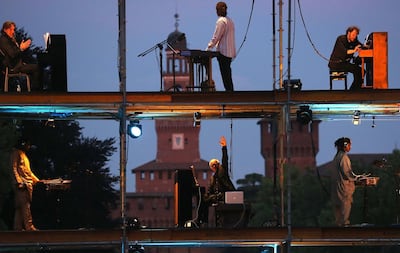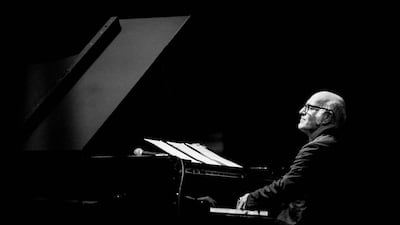To get to the stage at Frankfurt's storied Alte Oper, an artist must take a lift down from the changing rooms and walk through a maze of corridors before stepping into the grand 19th-century concert hall. Ludovico Einaudi has performed a variation of this trek many times before, in various venues, countries and hemispheres. And it will be repeated when he returns to the UAE for a concert at Dubai Opera on Monday, February 3. "The locations may be different, but it is still the same," the Milanese pianist and composer tells me.
Just a few hours before his Frankfurt concert, part of a sold-out European winter tour, we are in a small rehearsal room that Einaudi is surveying quizzically. He gestures to a grand piano in a corner of the room. "We are in a big building with many rooms and you can eventually get lost," he explains. "But this room seems familiar to me. I think I have been here before, but the piano was in another position. This happens to us a lot in our lives."
This meditation forms the central theme of Einaudi's most ambitious project to date. Released sporadically over the past year, Seven Days Walking is a mammoth seven-volume series of albums, consisting of some of his most minimal recordings. While the whole body of work adds up to an incredible 80 tracks, they should not be treated as separate pieces. Each volume offers subtle variations of the central melodic themes that Einaudi explores in the project. They may sound similar, but the emphasis changes in each piece. It is a bit like being in the aforementioned room, but with the furniture rearranged.

Listening to the project in full (the duration is about six hours) makes for an evocative and initially disconcerting experience. Each volume builds on the concepts, or in some cases, answers melodic questions posed in the previous instalment. Einaudi suggests that this is how the brain works. "I am attempting to make the music develop like the way we think," he says. "That is, you start to think of something and at that initial stage it is only skeletal, and then you add the flesh and you keep developing. Shakespeare said that we are made of the consistency of dreams – I think that what he meant was the consistency of our thoughts, and this music looks at that."
True to its serene and desolate nature, the project was inspired by Einaudi's regular winter walks at the foot of the Alps in the north-western Italian region of Piedmont. By following the same trail through the olive groves and vineyards, he began to see new details emerge within a storm-ravaged landscape – "stripped bare by the cold, it lost its contours and colours". Perhaps to confirm his suspicions, he took a series of shots on a Polaroid camera during his sojourns. Seven Days Walking is essentially an aural documentation of that photo series. This might sound like a lot of effort to summon inspiration. Then again, it is Einaudi's unique frame of references that have made him classical music's most unlikely star.
The first volume of the album, released on March 1, became the fastest streamed classical album of all time. According to his record label, Decca, it recorded more than two million streams on its first day of release. This follows his other crossover albums, such as 2015's Elements, where the orchestral flourishes and undulating arpeggios were partly inspired by the periodic table and the work of Russian abstract painter Wassily Kandinsky – and his brilliant 1996 Le Onde, which took its cues from Virginia Woolf's 1931 novel The Waves. Einaudi is also renowned for his soundtrack work, including for 2011's French blockbuster The Intouchables and J Edgar, the Leonardo DiCaprio film released the same year.
This restless creative spirit stems from a background that was both privileged and reactionary. Born to a family of esteemed lineage – his grandfather was former Italian president Luigi Einaudi, while his father, Calvino, was a successful publisher responsible for releasing works by the famed Italian writers Italo Calvino and Primo Levi – Einaudi began playing the piano as a child under the instruction of his mother.
In addition to his love for The Beatles, Jimmy Hendrix and films by Italian master Michelangelo Antonioni, Einaudi credits his move away from traditional compositional practice to Luciano Berio, his teacher at the Milan Conservatory.
Under his baton, Einaudi learned that life could be his songbook. “He was a very interesting mind and challenged the limit when it comes to relating music with various thing such as the sciences,” he says. “I learned to mix disciplines from him.”
Einaudi recalls a particular lesson from Berio that inspired his approach to Seven Days Walking. "Many years ago, we were strolling in the countryside. We were looking at some birds flying in the sky and they were drawing an incredible pattern together," he says. "Luciano looked at me and said: 'Wouldn't it be interesting to use this movement that the birds are doing, this amazing choreography, and transcribe it for a piece for strings?'
This could go some way in explaining Einaudi’s wide appeal. The ethereal quality to his music has resulted in a fan base that challenges traditional perceptions of the classical music fan. At the concert I attend in Frankfurt, a large contingent of the crowd are young – decked in jeans, boots and designer jackets.
That said, Einaudi is weary of suggestions that his work can act as the bridge to a genre best described as niche. And who could blame him? Einaudi’s significant success has come with its own share of detractors - classical music critics and musicians alike.
In a scathing one-star concert review by The Guardian this year, the writer expressed his bafflement at the adoration afforded to a music with "no range of colour, timbre or attack". Meanwhile, in an interview with The National last month, French pianist and classic music rising star Lucas Debargue labelled Einaudi's efforts as "the soundtrack of a bad boring movie".
Einaudi shrugs of the criticism, maintaining that he never felt as if he were part of the establishment anyway. “I have always developed and followed my idea of music and when I am doing that, I am not thinking about the term ‘classical music’. So, in a way, I created my world and I'm there,” he says.
“I think, for my expression, I need to be this way - isolated and free to create many things. I am an artist that needs space. I need to be in my world to be able to say what I want to say.”
Read More
A guide to Abu Dhabi Classics 2020: from Majida El Roumi to Beethoven at du Arena
Cultural capital: Abu Dhabi is a city to contend with on the global events calendar
With Seven Days Walking brimming with intimate subtleties and hazy variations, Einaudi elected to downscale his touring venues from arenas to halls. He says Dubai Opera was handpicked by his team due to its superb acoustics. Einaudi still holds warm memories of selling out two shows at the venue in 2017. He says he looks forward to taking that walk, once again, to the concert stage.
“No matter how much time you are doing this, you never have expectations. This is especially the case when you perform in a new place like the UAE,” he says. “I was very happy to feel that a different culture was approaching my music and they get in touch with what I am doing. It makes the journey all the more fascinating.”
Ludovico Einaudi, Monday, February 3, 2019. 8pm. Tickets begin from Dh200, Dubai Opera; Downtown Dubai; Dubaiopera.com


